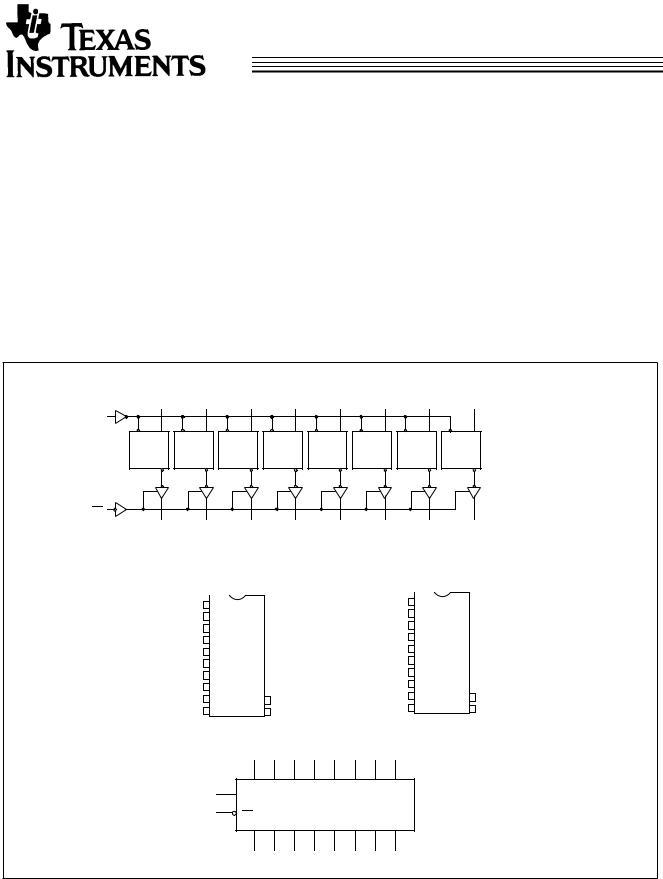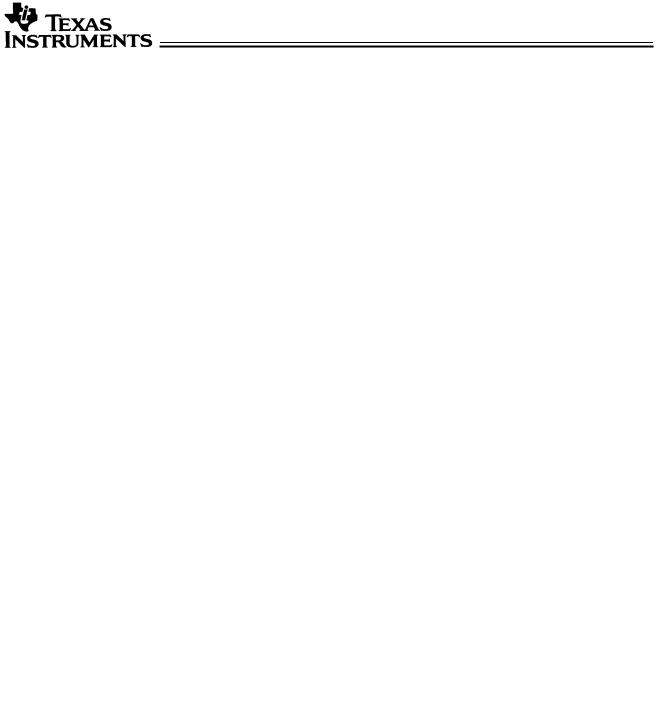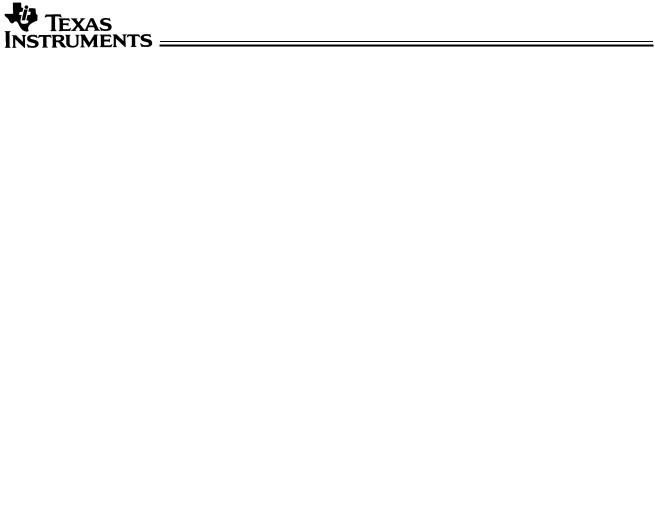Texas Instruments CY74FCT573CTQC, CY74FCT573ATSOCT, CY74FCT573ATSOC, CY74FCT573ATQC, CY74FCT573ATPC Datasheet
...
Data sheet acquired from Cypress Semiconductor Corporation. Data sheet modified to remove devices not offered.
CY54/74FCT373T
CY54/74FCT573T
SCCS021 - May 1994 - Revised February 2000
8-Bit Latches
Features
•Function and pinout compatible with FCT, and F logic
•FCT-C speed at 4.2 ns max. (Com’l),
FCT-A speed at 5.2 ns max. (Com’l)
• Reduced V (typically = 3.3V) versions of equivalent
OH
FCT functions
•Edge-rate control circuitry for significantly improved noise characteristics
•Power-off disable feature
•ESD > 2000V
•Matched rise and fall times
•Extended commercial range of−40˚C to +85˚C
•Fully compatible with TTL input and output logic levels
• Sink current |
64 mA (Com’l), 32 mA (Mil) |
Source current |
32 mA (Com’l), 12 mA (Mil) |
Functional Description
The FCT373T and FCT573T consist of eight latches with three-state outputs for bus organized applications. When latch enable (LE) is HIGH, the flip-flops appear transparent to the data. Data that meets the required set-up times are latched when LE transitions from HIGH to LOW. Data appears on the bus when the (OE) is LOW. When output enable is HIGH, the bus output is in the impedance state. In this mode, data may be entered into the latches. The FCT573T is identical to the FCT373T except for the flow-through pinout, which simplifies board design.
The outputs are designed with a power-off disable feature to allow for live insertion of boards.
Logic Block Diagram
D0 |
D1 |
D2 |
D3 |
D4 |
D5 |
D6 |
D7 |
LE |
CP |
D |
CP |
D |
CP |
D |
CP |
D |
CP |
D |
CP |
D |
CP |
D |
CP |
D |
|
Q |
|
Q |
|
Q |
|
Q |
|
Q |
|
Q |
|
Q |
|
Q |
OE |
|
|
|
|
|
|
|
|
|
|
|
|
|
|
|
|
O0 |
|
O1 |
|
O2 |
|
O3 |
|
O4 |
|
O5 |
|
O6 |
|
O7 |
Pin Configurations
|
|
|
DIP/SOIC/QSOP |
|
|
|
DIP/SOIC/QSOP |
||||||||||
|
|
|
|
|
Top View |
|
|
|
|
|
|
|
Top View |
|
|
||
|
|
|
|
|
|
|
|
|
|
|
|
|
|
|
|
|
|
|
|
|
|
|
|
|
|
|
|
|
|
|
|
|
|
|
|
|
|
|
|
|
|
|
|
|
OE |
1 |
|
20 |
|
VCC |
|||
OE |
1 |
|
20 |
|
VCC |
D0 |
|
|
|
|
|||||||
|
|
|
|
|
|
|
|
|
|
||||||||
O |
2 |
|
19 |
|
O7 |
2 |
|
19 |
|
O0 |
|||||||
0 |
|
|
|
D1 |
3 |
|
18 |
|
O1 |
||||||||
D0 |
3 |
|
18 |
|
D7 |
|
|
||||||||||
|
|
|
|
||||||||||||||
D1 |
4 |
|
17 |
|
D6 |
D2 |
4 |
|
17 |
|
O2 |
||||||
|
|
|
|
|
FCT373T |
|
|
D3 |
5 |
FCT573T |
|
O3 |
|||||
O |
5 |
|
O |
|
16 |
|
|||||||||||
1 |
|
|
16 |
|
6 |
D4 |
6 |
|
15 |
|
O4 |
||||||
O2 |
6 |
|
15 |
|
O5 |
|
|
||||||||||
D2 |
7 |
|
14 |
|
D5 |
D5 |
7 |
|
14 |
|
O5 |
||||||
D3 |
8 |
|
13 |
|
D4 |
D6 |
8 |
|
13 |
|
O6 |
||||||
O3 |
9 |
|
12 |
|
O4 |
D7 |
9 |
|
12 |
|
O7 |
||||||
|
|
GND |
10 |
11 |
|
LE |
|||||||||||
GND |
10 |
11 |
|
LE |
|
||||||||||||
|
|
|
|
|
|
|
|
|
|
||||||||
Logic Symbol
D0 D1 D2 D3 D4 D5 D6 D7
LE
OE
O0 O1 O2 O3 O4 O5 O6 O7
Copyright © 2000, Texas Instruments Incorporated

CY54/74FCT373T
CY54/74FCT573T
Function Table[1]
|
|
|
Inputs |
|
Outputs |
|
|
|
|
|
|
|
|
|
LE |
D |
O |
|
OE |
||||
|
|
|
|
|
|
|
L |
H |
H |
H |
|
|
|
|
|
|
|
|
L |
H |
L |
L |
|
|
|
|
|
|
|
|
L |
L |
X |
Q0 |
|
|
H |
X |
X |
Z |
|
|
|
|
|
|
|
Maximum Ratings[2, 3]
(Above which the useful life may be impaired. For user guidelines, not tested.)
Storage Temperature ................................. |
–65°C to +150°C |
Ambient Temperature with |
–65°C to +135°C |
Power Applied ............................................. |
Electrical Characteristics Over the Operating Range
Supply Voltage to Ground Potential............... |
–0.5V to +7.0V |
|
DC Input Voltage ........................................... |
–0.5V to +7.0V |
|
DC Output Voltage......................................... |
–0.5V to +7.0V |
|
DC Output Current (Maximum Sink Current/Pin) ...... |
120 mA |
|
Power Dissipation .......................................................... |
|
0.5W |
Static Discharge Voltage............................................ |
|
>2001V |
(per MIL-STD-883, Method 3015)
Operating Range
|
|
Ambient |
|
Range |
Range |
Temperature |
VCC |
Commercial |
T, AT, CT |
–40°C to +85°C |
5V ± 5% |
|
|
|
|
Military[4] |
All |
–55°C to +125°C |
5V ± 10% |
Parameter |
Description |
|
|
Test Conditions |
|
Min. |
Typ.[5] |
Max. |
Unit |
||
VOH |
Output HIGH Voltage |
VCC=Min., IOH=–32 mA |
Com’l |
2.0 |
|
|
V |
||||
|
|
|
VCC=Min., IOH=–15 mA |
Com’l |
2.4 |
3.3 |
|
V |
|||
|
|
|
VCC=Min., IOH=–12 mA |
Mil |
2.4 |
3.3 |
|
V |
|||
VOL |
Output LOW Voltage |
VCC=Min., IOL=64 mA |
Com’l |
|
0.3 |
0.55 |
V |
||||
|
|
|
VCC=Min., IOL=32 mA |
Mil |
|
0.3 |
0.55 |
V |
|||
VIH |
Input HIGH Voltage |
|
|
|
|
|
2.0 |
|
|
V |
|
VIL |
Input LOW Voltage |
|
|
|
|
|
|
|
0.8 |
V |
|
VH |
Hysteresis[6] |
All inputs |
|
|
|
0.2 |
|
V |
|||
VIK |
Input Clamp Diode Voltage |
VCC=Min., IIN=–18 mA |
|
|
–0.7 |
–1.2 |
V |
||||
II |
Input HIGH Current |
VCC=Max., VIN=VCC |
|
|
|
5 |
A |
||||
IIH |
Input HIGH Current |
VCC=Max., VIN=2.7V |
|
|
|
±1 |
A |
||||
IIL |
Input LOW Current |
VCC=Max., VIN=0.5V |
|
|
|
±1 |
A |
||||
IOZH |
Off State HIGH-Level Output |
VCC=Max., VOUT=2.7V |
|
|
|
10 |
A |
||||
|
|
Current |
|
|
|
|
|
|
|
|
|
|
|
|
|
|
|
|
|
||||
IOZL |
Off State LOW-Level |
VCC=Max., VOUT=0.5V |
|
|
|
–10 |
A |
||||
|
|
Output Current |
|
|
|
|
|
|
|
|
|
|
|
|
|
|
|
|
|
|
|
|
|
I |
OS |
Output Short Circuit Current[7] |
V |
CC |
=Max., V |
0.0V |
|
–60 |
–120 |
–225 |
mA |
|
|
|
OUT= |
|
|
|
|
|
|
||
IOFF |
Power-Off Disable |
VCC=0V, VOUT=4.5V |
|
|
|
±1 |
A |
||||
Notes:
1.H = HIGH Voltage Level L = LOW Voltage Level X = Don’t Care
Z = HIGH Impedance
Qn = Previous state of flip flops (Qn-1)
2.Unless otherwise noted, these limits are over the operating free-air temperature range.
3.Unused inputs must always be connected to an appropriate logic voltage level, preferably either VCC or ground.
4.TA is the “instant on” case temperature.
5.Typical values are at VCC=5.0V, TA=+25˚C ambient.
6.This parameter is specified but not tested.
7.Not more than one output should be shorted at a time. Duration of short should not exceed one second. The use of high-speed test apparatus and/or sample and hold techniques are preferable in order to minimize internal chip heating and more accurately reflect operational values. Otherwise prolonged shorting of a high output may raise the chip temperature well above normal and thereby cause invalid readings in other parametric tests. In any sequence of parameter tests, IOS tests should be performed last.
2

CY54/74FCT373T
CY54/74FCT573T
Capacitance[6]
Parameter |
|
Description |
Typ.[5] |
Max. |
Unit |
CIN |
Input Capacitance |
|
6 |
10 |
pF |
COUT |
Output Capacitance |
|
8 |
12 |
pF |
Power Supply Characteristics
Parameter |
Description |
Test Conditions |
Typ.[5] |
Max. |
Unit |
ICC |
Quiescent Power Supply Current |
VCC=Max., VIN ≤ 0.2V, VIN ≥ VCC – 0.2V |
0.1 |
0.2 |
mA |
ICC |
Quiescent Power Supply Current |
VCC=Max., VIN=3.4V, f1=0, Outputs Open[8] |
0.5 |
2.0 |
mA |
|
(TTL inputs HIGH) |
|
|
|
|
|
|
|
|
|
|
ICCD |
Dynamic Power Supply Current[9] |
VCC=Max., One Input Toggling, |
0.6 |
0.12 |
mA/MHz |
|
|
50% Duty Cycle, Outputs Open, |
|
|
|
|
|
OE=GND, VIN ≤ 0.2V or VIN ≥ VCC – 0.2V |
|
|
|
IC |
Total Power Supply Current[10] |
VCC=Max., 50% Duty Cycle, Outputs Open, |
0.7 |
1.4 |
mA |
|
|
One Bit Toggling at f1=10 MHz, |
|
|
|
|
|
OE=GND, LE=VCC |
|
|
|
|
|
VIN ≤ 0.2V or VIN ≥ VCC – 0.2V |
|
|
|
|
|
VCC=Max., 50% Duty Cycle, Outputs Open, |
1.0 |
2.4 |
mA |
|
|
One Bit Toggling at f1=10 MHz, |
|
|
|
|
|
OE=GND, LE=VCC, VIN=3.4V or VIN=GND |
|
|
|
|
|
VCC=Max., 50% Duty Cycle, Outputs Open, |
1.3 |
2.6[11] |
mA |
|
|
Eight Bits Toggling at f1=2.5 MHz, |
|
|
|
|
|
OE=GND, LE=VCC, |
|
|
|
|
|
VIN ≤ 0.2V or VIN ≥ VCC – 0.2V |
|
|
|
|
|
VCC=Max., 50% Duty Cycle, Outputs Open, |
3.3 |
10.6[11] |
mA |
|
|
Eight Bits Toggling at f1=2.5 MHz, |
|
|
|
|
|
OE=GND, LE=VCCVIN=3.4V or VIN=GND |
|
|
|
Notes: |
|
|
|
|
|
8.Per TTL driven input (VIN=3.4V); all other inputs at VCC or GND.
9.This parameter is not directly testable, but is derived for use in Total Power Supply calculations.
10. IC |
= IQUIESCENT + IINPUTS + IDYNAMIC |
|
IC |
= |
ICC+ ICCDHNT+ICCD(f0/2 + f1N1) |
ICC |
= Quiescent Current with CMOS input levels |
|
ICC |
= Power Supply Current for a TTL HIGH input (VIN=3.4V) |
|
DH |
= Duty Cycle for TTL inputs HIGH |
|
NT |
= Number of TTL inputs at DH |
|
ICCD |
= Dynamic Current caused by an input transition pair (HLH or LHL) |
|
f0 |
= Clock frequency for registered devices, otherwise zero |
|
f1 |
= |
Input signal frequency |
N1 |
= |
Number of inputs changing at f1 |
All currents are in milliamps and all frequencies are in megahertz.
11. Values for these conditions are examples of the ICC formula. These limits are specified but not tested.
3
